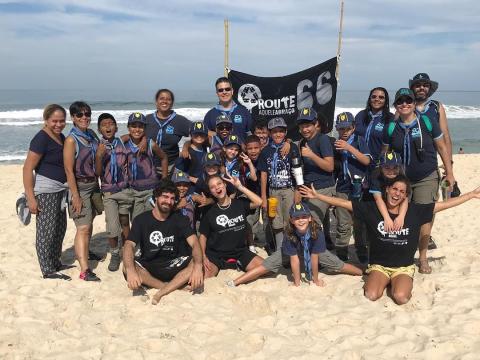“Aquele abraço” (“That hug”) - Beach cleaning in Rio de Janeiro, Brazil

In 1992, during the United Nations Conference on Environment and Development (Rio-92), World Oceans Day was declared on June 8th.
To celebrate that date in the city where it was established, the NGO Route Brasil launched the challenge of bringing together 18,000 people, distributed by 103 Posts on the coast (18.3 km in length), to embrace and clean three beaches of Rio de Janeiro (Barra da Tijuca, Reserva y Recreio), in the event called “Aquele Abraço” (“Aquel Abrazo”)[1]. Doing so, the aim was to draw the attention of the authorities and the public to the problem of the pollution of the oceans caused by the inadequate disposal of waste, especially plastic waste, which has been causing great damage to the environment.
The Scouts of Brazil were one of the first institutions to support the event, with a commitment to bring together a minimum of 1,000 volunteers. And we did it! More than a thousand members of the Scout Movement in the municipality of Rio de Janeiro gave a symbolic “embrace to the Ocean” last June 8.
They concentrated on the Reserve Beach, distributed by about 2 km of strip and, after the hug, they did a great cleaning job to collect the garbage found in the beaches.
All the waste taken from the beaches was taken to a sorting plant and, from there, separated, packaged, compacted and sold to recycling industries.
It is estimated that between five and eight million tons of plastic arrive each year to the seas, where they are ingested by turtles, birds, fish, whales and other marine species. Drifting plastic is easily confused with jellyfish, a basic food component of several marine species, which do not digest plastic. Thus, these species have the feeling of being fed and end up dying of starvation.
The Ellen MacArthur Foundation estimates that, until 2050, if we continue to deal with nature in the same way as we do today, we will have more plastic than fish in the oceans, and it is true that micro plastics have already reached the human food chain.
The truth is that we don't throw out the trash, but throw it inside our planet. That is why we must create alternatives to generate the least amount of waste possible, with the 5 "R" before purchasing and thus prioritise the reduction of consumption and re-use of materials.:
- Reduce
- Rethink
- Reuse
- Recycle
- Reject the consumption of products that generate significant socio-environmental impacts.
[1] "Aquele Abraço" is a song by Brazilian singer-songwriter Gilberto Gil, composed in 1969, famous for highlighting the natural beauties, places and people of Rio de Janeiro.


